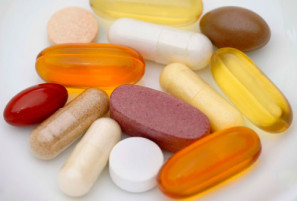 If you were to open most athletes’ kitchen cabinet, you’ll probably find a shelf of supplements: the typical sports nutrition cache of electrolyte drinks, bars, recovery drinks, and most often an array of vitamins/supplements purported to maximize workouts, speed recovery, and minimize downtime and the risk of injury. Most of us are aware that the FDA doesn’t tightly regulate supplements, and often the effects are over-exaggerated or lacking scientific merit. Recently the efficacy of vitamin supplementation has come under scientific scrutiny, in particular antioxidants.
If you were to open most athletes’ kitchen cabinet, you’ll probably find a shelf of supplements: the typical sports nutrition cache of electrolyte drinks, bars, recovery drinks, and most often an array of vitamins/supplements purported to maximize workouts, speed recovery, and minimize downtime and the risk of injury. Most of us are aware that the FDA doesn’t tightly regulate supplements, and often the effects are over-exaggerated or lacking scientific merit. Recently the efficacy of vitamin supplementation has come under scientific scrutiny, in particular antioxidants.
The blurred line comes from the existing mentality “what is good in small doses must be great in large quantities”.
For example, there is strong epidemiological data to suggest that a diet rich in foods that are naturally high in antioxidants is associated with better health outcomes. But when using supplements, the data shifts- individuals supplementing with high dose antioxidants actually have worse health outcomes.
“But I’m an athlete and my body experiences a significantly greater exposure to oxidation because of my training. I need supplements! I can’t eat 10 pounds of kale a day….” you say. Hold on, let’s examine what oxidation in the body actually is…
The powerhouse of the cells are cellular organelles called mitochondria, where the body converts food to energy, a process that requires oxygen, thus it’s called oxidation. As endurance athletes, we know the importance of oxygen for steady-state power output (aerobic pathway) but the metabolites leftover from the conversion of food to fuel have the potential to do cellular damage in the form of “reactive oxygen species” or ROS. Cumulative damage of ROS is referred to as “oxidative stress” and is generally considered as one of the major factors leading to DNA damage. This is where antioxidants come into play. Antioxidants work to eliminate oxidative stress by neutralizing ROS as they develop, preventing cell damage. Here is the key concept: the body has a series of complex systems to produce its own natural antioxidants to neutralize specific ROS – processes which are too critical and intricate to rely solely on the ingestion of antioxidants.
Exercise, especially that of long duration or high intensity, and its consequent tissue injuries are known to increase ROS production in mitochondria. To overcome this increased ROS production, the body must experience the stress and boost its antioxidant capacity (remember, these are complex systems, and there is not just one component that is increased but a series of feedback mechanisms) naturally. When an athlete increases their antioxidant intake through supplementation, the body doesn’t fully adapt to increase these systems as the sudden, high dose of antioxidant interferes with the natural adaptation process. The “backlash” can be more harmful than neutral. Reviewing key studies on the effects of antioxidant supplements on exercise-induced muscle damage are telling: Measurement of muscle damage in the bloodstream — enzymes like creatine kinase, which are an indicator of cell rupture— shows no strong evidence to support supplementation as having any meaningful effect on muscle damage. What’s more concerning is that some studies have suggested that supplements may induce muscle injury and actually delay recovery.
The acute recovery period is where we find the most concerning data. Antioxidant supplements seem to be working against the beneficial effects of exercise:
- Promoting, rather than reducing, oxidative stress: In some cases, supplements appear to raise indicators of inflammation, rather than reduce them.
- Reducing the ability to adapt to exercise-induced oxidative stress: Cells will naturally adapt to increases in ROS by upregulating their natural enzymatic feedback systems. Supplements have been shown to actually inhibit adaptation.
- Affecting physiologic processes like muscle contraction and insulin sensitivity: Supplementation, by affecting the concentration of ROS, may interfere with muscle function and recovery from the effects of exercise. Several recent studies identified that supplementation with vitamins E and C inhibited the usual insulin-sensitizing effects of exercise. The result: inhibited glycogen recovery and reduced muscle fiber repair.
So, as an endurance athlete, you’re saying I don’t need any supplements, in fact they could be harmful to getting fitter and faster?
The short answer is “Yes”. In light of what we know about antioxidants and exercise, the trend in the data is strongly suggestive of zero benefit, at best, with the real possibility that there may be negative consequences to supplementation. We aren’t as smart as nature. Our bodies need the chance to understand and overcome stress (the whole concept behind training and adaptation); look to use real food as the functional components to the intricate feedback systems and leave the bottle of supplements on the shelf.
So, I can eat my antioxidants in food, just not in supplements?
Not right away. No berries or similarly antioxidant rich foods immediately after exercise. Wait 4-5 hours post exercise once the acute recovery period is over. Sorry smoothie lovers.
 Stacy Sims, MSc, PhD, served as an exercise physiologist and nutrition scientist at Stanford University specializing in recovery and nutritional adaptations for health, body composition, and maximizing performance. During the past decade she has worked as an environmental physiologist and nutrition specialist for top professional cyclists and triathletes, ultra-endurance athletes, the Garmin/Slipstream Pro Cycling Team, USA Cycling Olympic Team (BMX and women’s track cycling), Team Tibco, Flying Lizard Motorsports, and Team Leopard-Trek, among others. She competes as a Cat 1 road cyclist and elite XTerra triathlete and is co-founder of OSMO Nutrition.
Stacy Sims, MSc, PhD, served as an exercise physiologist and nutrition scientist at Stanford University specializing in recovery and nutritional adaptations for health, body composition, and maximizing performance. During the past decade she has worked as an environmental physiologist and nutrition specialist for top professional cyclists and triathletes, ultra-endurance athletes, the Garmin/Slipstream Pro Cycling Team, USA Cycling Olympic Team (BMX and women’s track cycling), Team Tibco, Flying Lizard Motorsports, and Team Leopard-Trek, among others. She competes as a Cat 1 road cyclist and elite XTerra triathlete and is co-founder of OSMO Nutrition.
Recommended reading:
- Peternile and Coombes: http://www.ncbi.nlm.nih.gov/pubmed/22060178
- Paulsen et al: http://jp.physoc.org/content/early/2014/01/31/jphysiol.2013.267419.abstract
- Gliemann et al: http://www.ncbi.nlm.nih.gov/pubmed/23878368
- Paik et al: http://www.ncbi.nlm.nih.gov/pubmed/?term=10.1016%2Fj.bbrc.2009.03.135
- Strobel et al: http://www.ncbi.nlm.nih.gov/pubmed/?term=10.1249%2FMSS.0b013e318203afa3